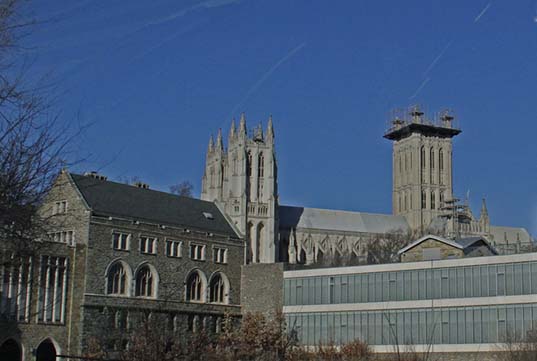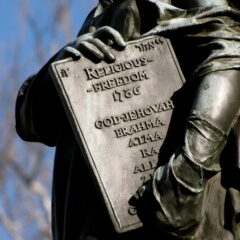The recent controversy over the presidential inaugural benediction provides a nice opening for considering the role such acts play in America today. One might ask why in a pluralistic, disestablished society we need the “blessings” of invocations and benedictions in the first place. It might appear as though the recent trouble with the originally chosen pastor for the benediction—Louis Giglio, an Atlanta-area conservative evangelical pastor best know for his anti-slavery ministry—demonstrated in clear terms the problems with the institutional mingling of religion and politics. But appearances, in this case, are deceiving. I want to argue that what the Giglio controversy suggests is that a particular type of this institutional mingling—civil religion—is making a comeback, not as a retrograde religious nationalism, but as a potentially progressive force.
First, a quick summary of the fiasco: Giglio, it unsurprisingly turns out, holds conventional conservative evangelical views on same-sex relationships, namely that they are sinful and should be denounced. Apparently, no one on the Presidential Inauguration Committee knew of these views and so only a day after it was announced, Giglio dropped out and the committee issued a statement saying that this time around, whomever is chosen for the benediction will “reflect this administration’s vision of inclusion and acceptance for all Americans.” Five days later, they chose the Reverend Luis León, an Episcopal pastor from a gay-affirming church close to the White House.
As anodyne as the committee’s terms “inclusion and acceptance” seem, this language gives us a clue into why the change from Giglio to León is so momentous and why the benediction is still a big deal. The benediction, the invocation, and the entire inauguration are a few of the very rare acts of civil religion still performed in America. They are civil rituals that do the work of focusing the attention of the collective on a common, sacred center and thus binding the collective; and they also do the work of displaying to the collective an ideal representation of itself. These two roles of civil ritual can be seen as its Durkheimian (social binding) and Geertzian (symbolic representation) aspects. Together they highlight how important the act and the symbolism surrounding the act of inauguration still are.
As Philip Gorski noted back in 2008, even before the Democratic nomination had been won, Obama seemed to have an unusually sensitive understanding of the power of civil religious language. Gorski, drawing of course on Robert Bellah’s well-known formulation, argues that Obama’s soaring rhetoric frames the terms of political debate within a binary: “civil religion vs. crusader nationalism.”
In civil religion, a polity is guided by transcendent—what Gorski calls “prophetic”—ideals that always stand outside the worldly functions, doings, and exigencies of governing. The ideals are not strictly religious, though they have religious roots. They are what we understand as civil rights: human dignity, equality under the law, representative governance, and so on. Crusader nationalism, however, is defined by a sense of inherent sacred “chosenness” that must be defended and imposed. It measures itself by past and hoped-for achievements that prove its chosenness. Crusader nationalism proclaims America great; civil religion places greatness in America’s principles.
As Obama enters his second term, he presides over a nation that continues, as ever, to struggle with its self-understanding. It is clear, however, that in this struggle Obama sides with civil religion, and not in any weak, innocuous way. By choosing a pastor for his inaugural benediction who affirms same-sex relationships and supports “inclusion and acceptance,” he is pointing the nation in the direction of a prophetic civil religion that has teeth. It is one that does not affirm our chosenness, but shines a bright light on our civil shortcomings.
But it is especially powerful for one other reason. It suggests that civil principles and rituals still have a certain “reality,” as the term was used by Peter Berger decades ago in The Sacred Canopy. Berger, explaining how religion in modern societies only has “reality” in private, familial contexts, remarks that “insofar as religion is common it lacks ‘reality,’ and insofar as it is ‘real’ it lacks commonality.” By “reality,” Berger is referring to the cultural power of religious practice to define identity and determine actions. And he is arguing that the more common—perhaps inclusive and accepting and civil?—religious action is, the less it can motivate and frame our lives.
But there is a commonality that still has the “reality” of this cultural power, and it can be found in the civil principles of civil religion. It is commonality as an ideal. It is the civil-prophetic voice that asks, What is the common good, and what are our obligations to it? And we know it continues to have “reality” because it can still be used to prophetically judge America’s actions, because it still provokes passion, and because citizens are still willing to take action in its name. As this past election showed, the changing attitudes and characteristics of the American electorate make this commonality-as-prophetic-ideal as urgent as ever.
“Washington National Cathedral,” photograph by DBking.
Justin Wilford is a guest contributor with the USC Center for Religion and Civic Culture.








